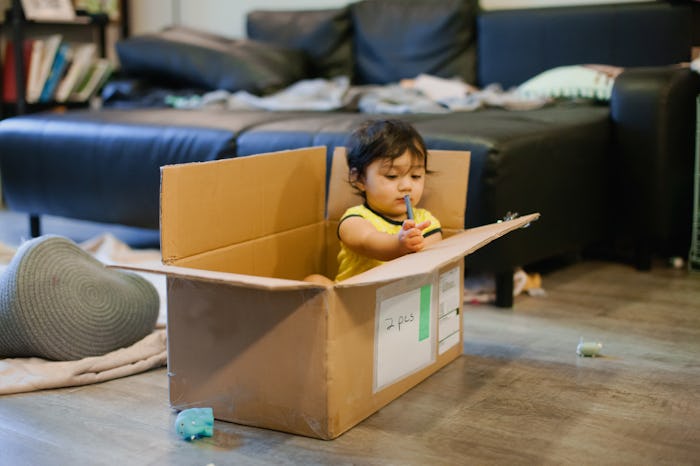Toddler

Encouraging Imaginative Play In Your Toddlers Can Be Fun For You, Too
Seriously, next time you're in the grocery store, make *them* wander down each aisle on an adventure to find breadcrumbs.
If you’re a parent who loves reading up on the latest ways to help your child become a super genius (or just develop healthily), you’ve probably at least heard of “imaginative play” and its benefits. But how can you encourage imaginative play in toddlers, especially when they’re obsessed with rewatching old episodes of Mickey Mouse Clubhouse?
Really, most parents would call imaginative play playing pretend or make-believe, noted Psychology Today. And Healthline suggested that the benefits include improving concentration skills and expressing emotions, and it’s important to play pretend often with kids from the newborn stage through age 7.
Victor Fornari, M.D., board-certified child psychiatrist and chief of Child/Adolescent Psychiatry at Northwell Health, tells Romper in an interview that just like tag or sports have physical benefits, imaginative play has mental and developmental perks. “Imaginative play encourages social and emotional development. It encourages coping and managing stress. Imaginative play stimulates creativity and playfulness. It’s like a social exercise for brain development.”
Karen Reckamp, pediatric rehabilitation manager and pediatric occupational therapist with Wolfson Children’s Rehab, says imaginative play is something you see kids do naturally all the time without realizing how helpful it is for their growing minds. “Imaginative thinking is more than just play; it is an important developmental skill that adults need to function effectively. It encourages social skill development by role playing and practicing social skills that children will experience in the real world,” she says in an interview with Romper. “Children learn to interact and compromise when playing with peers, that sometimes they won’t get what they want. It also teaches children to be creative and to find different ways to use and play with objects, though it doesn’t require toys. A box, for example, can become a house, train, or boat.”
If children play pretend naturally, why would parents need to encourage it? Well, technology tends to get in the way these days, and so do all the cool toys on the market. “Limit screen time,” says Fornari. “Have age-appropriate books and toys to read and play with infants, toddlers, and young children. Play together, but allow individual exploration as well. And keep stimulation to a minimum — a few toys at a time, or one book at a time.”
Reckamp agrees that having too many toys or books out can be overwhelming for little ones.
“Having too many toys discourages children from finding ways to entertain themselves when toys are not available,” she explains. “It’s always a good idea to limit the number of toys and to select toys that require the child to do more than to sit and watch. The video game and iPhone generation has led to children expecting immediate responses and continuous engagement or entertainment from others, but it’s OK to allow your child to be bored. They will ultimately find something creative and fun to do.”
If you’re looking for ways to help your kiddo spend more time on imaginative play, Reckamp suggests:
- Providing toys or other objects that require your toddler to use their imagination, like empty boxes, pots and pans, packing peanuts, building blocks, or LEGOs
- Encouraging children to create a show to share with the family, whether it’s a puppet show, magic show, play, musical, or dance performance
- Helping children build forts using blankets, tables, chairs, and pillows
- Going outside and asking children to create their own games using balls, empty laundry baskets, buckets, balloons, jump ropes, or sidewalk chalk
Playing pretend can be fun and silly, like showing your toddler that a towel can become a cape after bath time, or pretending to be an animal and asking your kiddo to join in, says Reckamp. It can even become a helpful tool for tough parenting moments.
“Pretend play is a good way to help children transition or do something that they find to be not fun. ‘Let’s pretend we are going to outer space and fly to get into our rocket,’ which is the car,” she says. “Or, in the grocery store, a parent can encourage the child to pretend to be a detective on the search for various items. The possibilities are endless, and will likely make everyday tasks more fun for the grown-ups too.”
Sources:
Victor Fornari, M.D., board-certified child psychiatrist and chief of Child/Adolescent Psychiatry at Northwell Health
Karen Reckamp, OTR/L, ATP, pediatric rehabilitation manager and pediatric occupational therapist with Wolfson Children’s Rehab
This article was originally published on